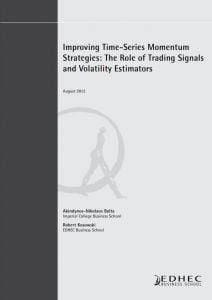

Improving Time-Series Momentum Strategies: The Role of Trading Signals and Volatility Estimators
Constructing a time-series momentum strategy involves the volatility-adjusted aggregation of univariate strategies and therefore relies heavily on the efficiency of the volatility estimator and on the quality of the momentum trading signal. Using a dataset with intra-day quotes of 12 futures contracts from November 1999 to October 2009, we investigate these dependencies and their relation to time-series momentum profitability and reach a number of novel findings.
Author(s):
Summary:
Constructing a time-series momentum strategy involves the volatility-adjusted aggregation of univariate strategies and therefore relies heavily on the efficiency of the volatility estimator and on the quality of the momentum trading signal. Using a dataset with intra-day quotes of 12 futures contracts from November 1999 to October 2009, we investigate these dependencies and their relation to time-series momentum profitability and reach a number of novel findings.
Register to download PDF
Register/Log in| Type : | Working paper |
|---|---|
| Date : | 08/06/2012 |
| Keywords : |
Commodities |

